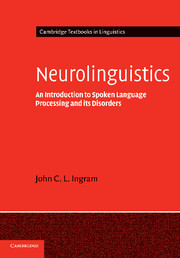Book contents
- Frontmatter
- Contents
- List of figures
- List of tables
- Preface and acknowledgements
- Note on the text
- Part I Foundational concepts and issues
- Part II Speech perception and auditory processing
- 5 The problem of speech recognition
- 6 Speech perception: paradigms and findings
- 7 The speech recognition lexicon
- 8 Disorders of auditory processing
- Part III Lexical semantics
- Part IV Sentence comprehension
- Part V Discourse: language comprehension in context
- Glossary
- References
- Index
6 - Speech perception: paradigms and findings
Published online by Cambridge University Press: 26 January 2010
- Frontmatter
- Contents
- List of figures
- List of tables
- Preface and acknowledgements
- Note on the text
- Part I Foundational concepts and issues
- Part II Speech perception and auditory processing
- 5 The problem of speech recognition
- 6 Speech perception: paradigms and findings
- 7 The speech recognition lexicon
- 8 Disorders of auditory processing
- Part III Lexical semantics
- Part IV Sentence comprehension
- Part V Discourse: language comprehension in context
- Glossary
- References
- Index
Summary
Introduction
In the previous chapter, we drew some tentative conclusions and made some quite strong claims about speech perception: that it is a ‘bottom-up’, highly modular process; that the objects of speech perception are abstract, hierarchically structured phonological targets; that speech differs in important respects from other kinds of auditory perception; that special, species-specific neural machinery may be required to support speech perception. It is time to consider more closely the experimental evidence to see if these claims can be substantiated, to examine the tools that have been developed for studying speech perception, and to approach the controversies that currently animate the field. We will not attempt a comprehensive review, but simply explore some long-standing themes and introduce the specialized experimental paradigms with which one needs to be familiar to understand current research.
One of the guiding themes of speech perception research has been the question of whether ‘speech is special’: whether specific adaptation of the perceptual system has occurred with the evolution of human language to support the demands of spoken communication. Several key concepts and experimental paradigms have been developed in an attempt to answer this question. Two early paradigms, dichotic listening and categorical perception, provide the foundational concepts for understanding contemporary issues. Specifically, the dichotic listening paradigm raises questions of hemispheric specialization and cortical mechanisms for speech perception that remain central to contemporary neuroimaging studies.
- Type
- Chapter
- Information
- NeurolinguisticsAn Introduction to Spoken Language Processing and its Disorders, pp. 112 - 139Publisher: Cambridge University PressPrint publication year: 2007

